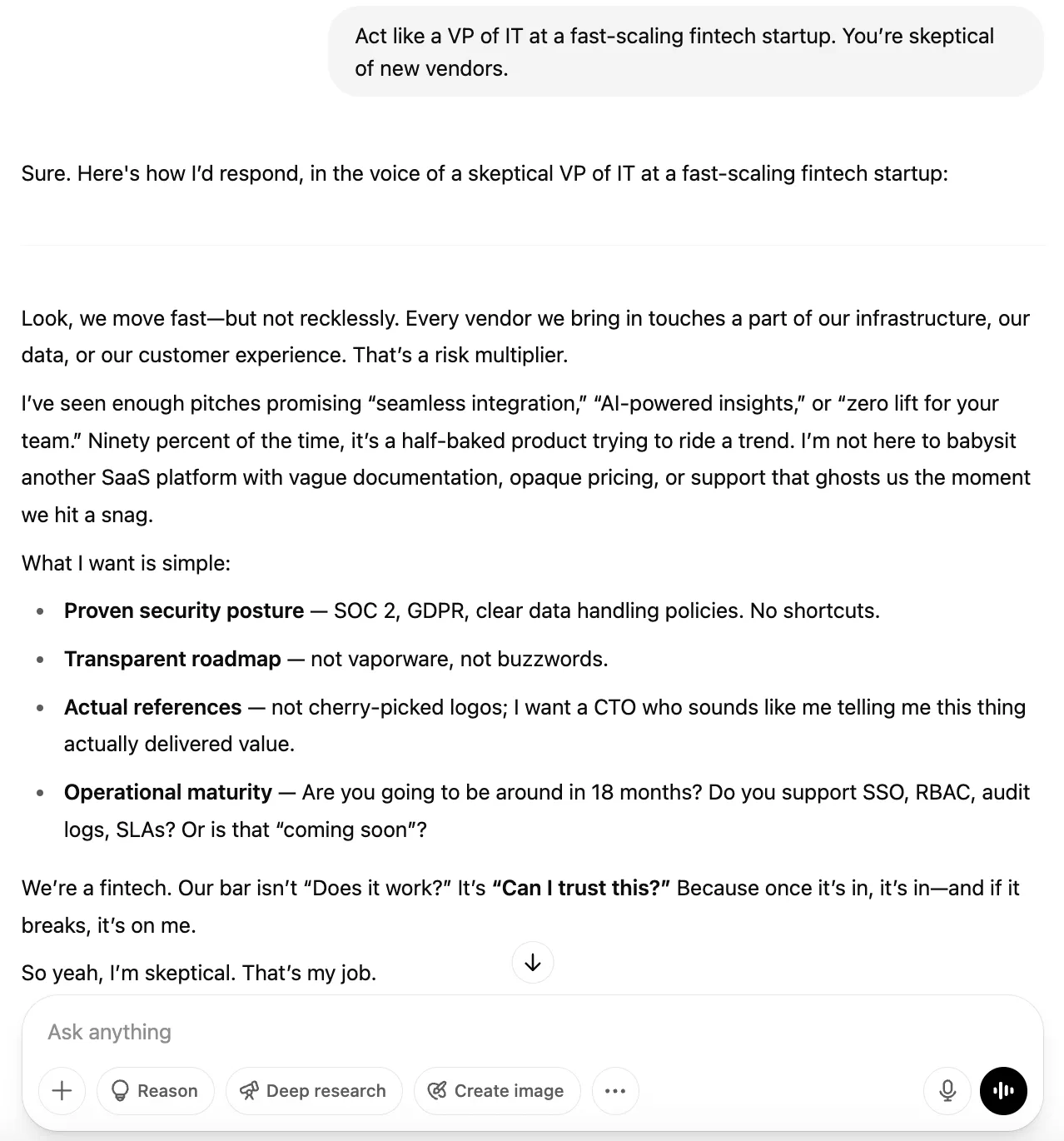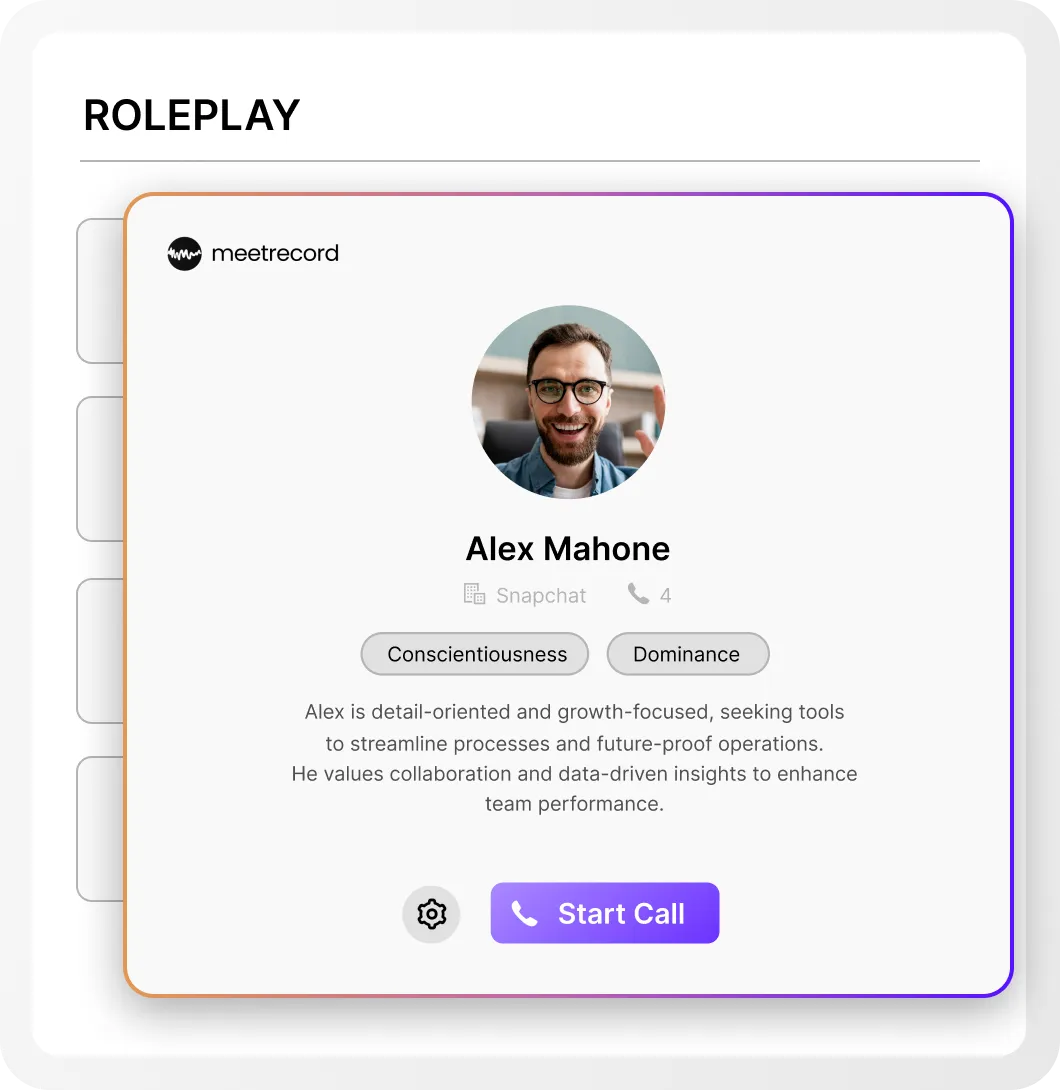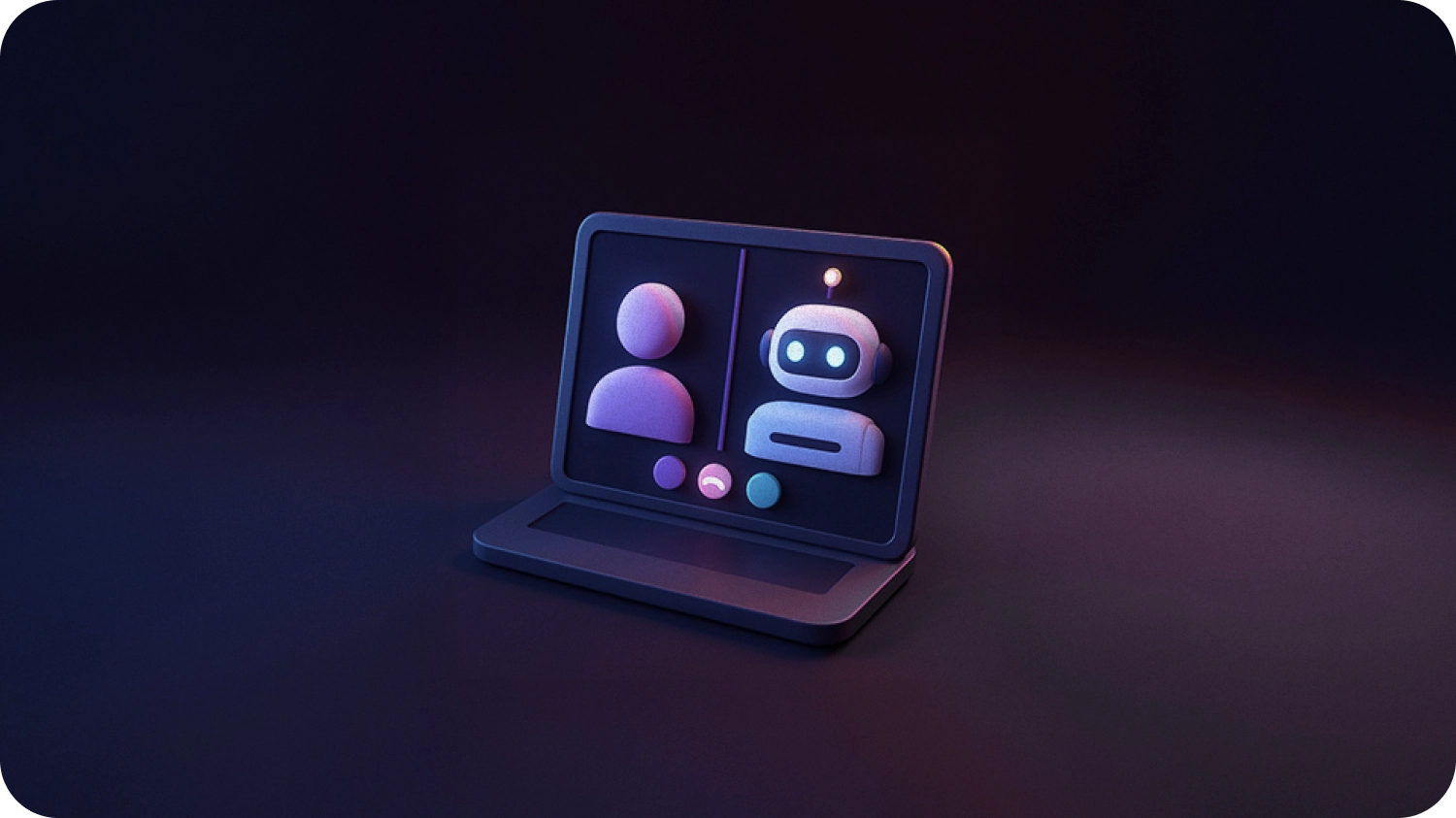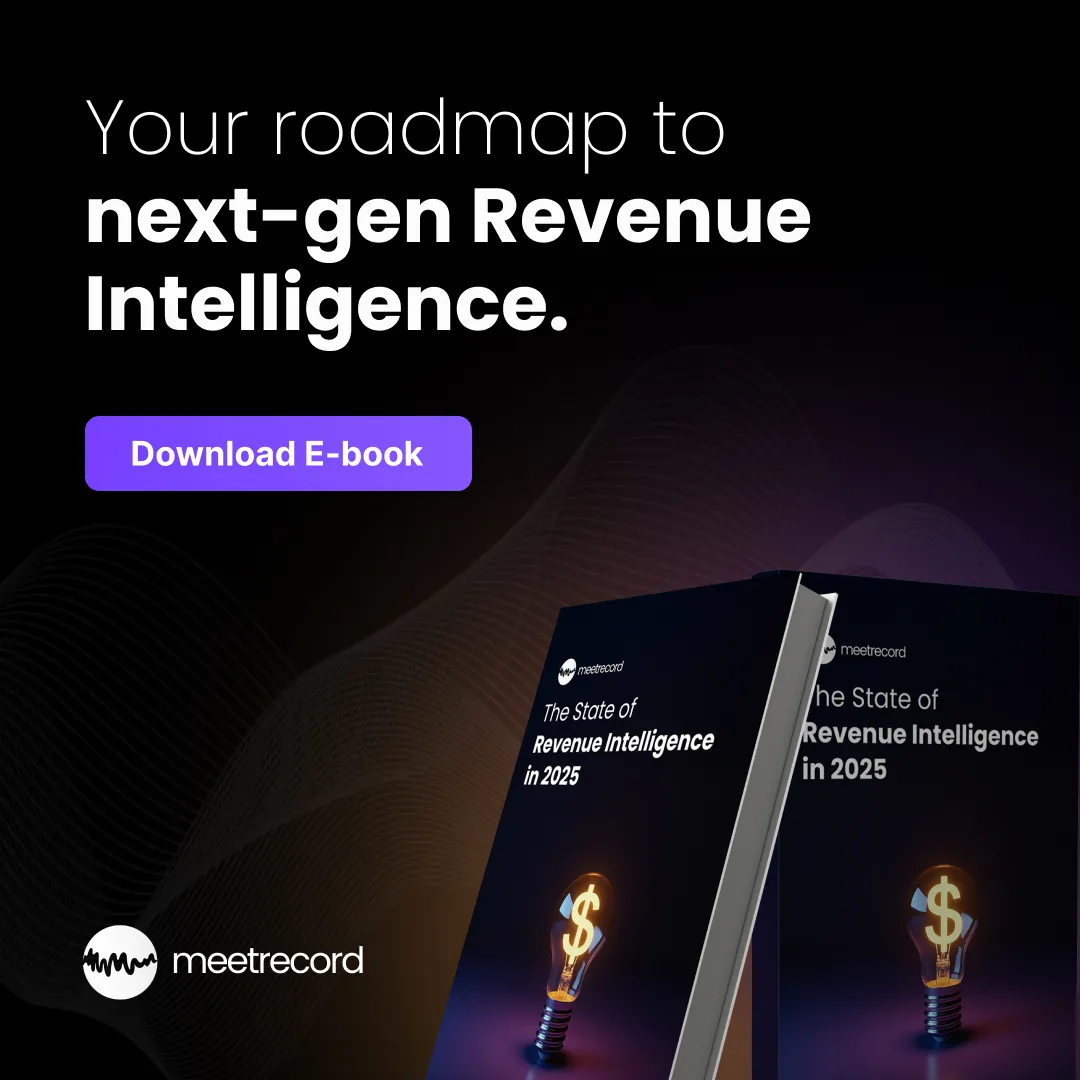If your reps aren't practicing roleplay on their own, they’re practicing on your company’s dime…with real prospects.
And that should worry you.
Let’s call it what it is: Roleplay is a joke in the sales circle. It’s irregularly done, unstructured, and awkward for everyone.
So, most teams replace it with more “important” things like pipeline reviews and forecast calls.
But the truth is that reps losing deals has a direct correlation to how much they have visualized and practiced a deal.
The average rep spends less than 5% of their week actually training. That’s like asking someone to crush a marathon after watching a few YouTube videos on running form.
AI roleplay for sales training matters more than you think. Yes, it sounds boring. But it makes practice unavoidable, repeatable, and measurable.
Tools like ChatGPT are a good start. But they’re just the tip of the iceberg.
In this blog, I break down what works, what doesn’t, and if AI roleplay can actually make an impact on how you train your reps.
How To Create Basic AI Roleplays Using ChatGPT
Most sales professionals overanalyze when it comes to prompting in ChatGPT.
You don’t need a custom GPT model or a 12-page prompt to start using AI for roleplay. You just need clarity on what you want to practice and who you want the AI to act like.
Done well, ChatGPT for sales can be a great way to test your pitch and make mistakes without putting real deals at risk.
Here are some ideas on how to use ChatGPT for basic AI roleplays for sales training program.
Common Use Cases ChatGPT Can Simulate
ChatGPT can play the role of a buyer remarkably well, if you give it the right instructions. Here are a few sales roleplay scenarios where it holds up surprisingly well in first drafts of training:
1. Discovery Calls
Test how your reps ask open-ended questions and dig for real pain points without stopping at shallow, one-word answers. Try the prompt:
“Act like a VP of IT at a fast-scaling fintech startup. You’re skeptical of new vendors.”
Here's how ChatGPT responded to me for that prompt:

2. Handling Objections
Let ChatGPT mimic common buyer reflexes, from pushing back on pricing to cliched objections such as “we’re already using something else.” These scenarios are useful for testing how well reps handle tension without sounding defensive.
3. Feature Demo Walkthroughs
Can your reps articulate your product’s value under pressure? Ask ChatGPT to challenge assumptions or ask for clarification questions, like a mildly impatient prospect.
4. Budget and Timeline Qualification
This is a common area many reps skip or gloss over because it's hard to bring up. Practice discussing budget and timeline with ChatGPT to get comfortable being polite yet assertive.
5. Closing Conversations
It's natural to sound eager when a deal looks promising. With ChatGPT, you can fine-tune your tone and timing so you stay clear and confident when discussing the next steps.
ChatGPT Prompts To Try for Sales Training
Once again, you don’t have to be a Hemingway to prompt ChatGPT. All you need is clear, short, and specific prompts that you are willing to iterate for best results. Here are a few to start with:
These prompts work best when you set a clear role, situation, and attitude to guide the AI’s behavior.
More often than not, AI responses are 100% satisfactory. You can also iterate with follow-up prompts:
- “Make this buyer more skeptical.”
- “Add more urgency. Assume that they have a tight deadline.”
- “Make the objections more technical.”
The only challenge here is that each chat is slightly different. ChatGPT doesn’t always retain context, tone, or nuance unless you keep reminding it.
But that lack of context can be a feature, not a bug. Real buyers are unpredictable too. They interrupt, don’t follow a structure, and challenge you just when things seem to be going smoothly.
The bottom line: ChatGPT isn’t perfect, but it’s a solid starting point.
Challenges of Using ChatGPT for Sales Roleplay
If you try using ChatGPT AI for roleplay and sales training, it’ll take less than five minutes for you to see the cracks in it.
Sure, it’s impressive, but far from perfect.
ChatGPT is more like a sparring partner than a full-time trainer. It helps with ideas and putting in the repetitions. But it can’t substitute an actual coaching session.
5 Common Problems with Using ChatGPT for Sales Roleplay
Here are the limitations you quickly run into when you only use ChatGPT as a sales training tool:
1. No Feedback on Tone and Non-Verbal Cues
Human communication is 55% nonverbal, 38% tone of voice, and just 7% words.
In sales, it’s not about what you say; it’s equally important how you say it. Sure, you can dictate your speech in ChatGPT, but it can’t judge your tone, pauses, pacing, or confidence in your voice.
And that’s a letdown because a big part of sales training is related to content delivery.
2. Conversations Lack Memory
I’m sure you share this frustration with me: ChatGPT doesn’t always remember what your last prompt or answer was.
You might mention budget constraints, then two messages later it acts like you never brought it up.
In sales, conversation loops build context and clarity. Buyers might reference past objections, test for consistency, and change their tone based on how you sound.
ChatGPT can’t track all of these nuances because each chat exists in a vacuum. That’s not how real conversations occur in the real-world.
3. Hallucinations Happen
Hallucinations are the biggest headache for anyone using AI right now. ChatGPT confidently generates false or misleading information that sounds believable.
For example, if you ask ChatGPT to roleplay a buyer evaluating multiple tools like yours, it might invent features you don’t have, misquote industry benchmarks, or mention fictional competitors.
It’s annoying, but also dangerous because reps can internalize the false data and accidentally use them in real calls with prospects.
You’ll need to fact-check the AI like a junior rep who skimmed the sales deck once and started pitching.
4. No Analytics Or Scoring
How do you measure the success of a roleplay interaction in ChatGPT? There’s practically no way except for how you might feel about it after a session.
ChatGPT doesn’t have a built-in feature to track performance. It can’t give you insights into what you did well. You can ask for feedback, which might be convoluted because of its lack of memory and broader sales context.
Therefore, you might walk away from a 15-minute roleplay thinking it went fine, but you don’t know how your talk time balanced out, whether your talk time ratio was off, or how often you interrupted.
In high-stakes sales, those details matter more than people think.
5. No CRM Or Pipeline Context
ChatGPT isn’t grounded in your CRM data. It can’t simulate real negotiation with your actual prospect who’s ghosted your last two emails.
It doesn’t understand that this deal is stuck with legal, that you’ve already discounted once, or that the buyer’s champion just left the company.
Sales roleplay in isolation is fine for the sake of practice. But when the stakes are high, and real, you need deal-specific coaching that can drive real-world results.
Traditional Roleplay vs ChatGPT vs AI Roleplay Tools
Great sales leaders understand the value of practice. That’s why they treat roleplaying and feedback sessions as non-negotiable.
But how reps practice is changing rapidly.
Traditional roleplay worked in the past. But it’s riddled with too many problems for modern sales teams to rely on.
For instance, reps have to find time on their managers’ calendar, the managers might give subjective feedback, and the mock interactions can feel awkward to both.
Traditional roleplay (and coaching, in general, to be honest) is losing its sheen because it’s inconsistent and difficult to scale.
But now we have AI and it’s a magic wand that changes everything. Right?
AI tools like ChatGPT are a step up in the right direction. Reps can simulate mock calls on their own. But it comes with all the challenges we discussed earlier: no nuanced feedback, conversations lack context, and hallucinations to make things worse.
So… no AI? On the contrary. The smartest sales teams today use advanced, LLM-trained AI tools to scale their sales training.
Modern AI roleplay tools combine CRM data, voice recognition, and behavioral analytics. Reps get the realism they need to visualize actual prospects and managers get post-call insights to identify coaching gaps.
Plus, this type of training is self-paced, measurable, and tied to outcomes.
Context and feedback makes all the difference when choosing between a basic AI assistant tool and an advanced, purpose-built AI tool built for sales roleplays.
They offer everything traditional methods lack (e.g. scalability) and go beyond the limitations of ChatGPT.
Here’s how they compare at a glance:
MeetRecord’s AI Sales Roleplay Tool: How It Works and Why It’s Different
This is not a sales pitch, but just a look inside what "AI roleplay done right" looks like.
There’s a difference between using AI to play sales and using it to get better at sales. One is a novelty and its value stops at entertainment. The other is a practice tool that helps reps train like professionals and maps to revenue.
Here’s what MeetRecord’s AI sales roleplay tool looks like under the hood:
1. Realistic Voice Simulation
Typing out a roleplay prompt in ChatGPT isn't practice, it’s just mental preparation.
Real sales happen over live calls, where tone, pacing, and even a five-second pause matter just as much.
MeetRecord’s voice-based roleplay engine lets reps practice in conditions that mimic the pressure and dynamics of an actual sales conversation. It trains what you say and how you say it. It’s the difference between practicing a craft and mastering it.
With MeetRecord, you can get detailed feedback on your tone, pitch, pauses, and delivery to identify quirks that don’t show up on transcripts.
Is your pitch monotonous? Do you tend to talk over the prospect? Do you use too many filler words? You’ll know instantly in the dashboard.
2. Contextual Personas From Your Deal History
Generic roleplay is better than nothing. But practice really sticks when it feels focused and intentional.
MeetRecord doesn’t simulate objections out of thin air. It creates buyer personas from your actual CRM and past call data.
You can create AI buyer avatars down to titles, objections, deal size, and decision cycle. Reps can rehearse calls with a “Head of Procurement from a Series C fintech” based on what’s there in the pipeline.
It’s much better than fictionalizing a buyer persona in traditional coaching or prompting ChatGPT to pretend to be someone it’s not.

3. Real-Time Scoring and Feedback
Most reps finish a roleplay wondering: How did I do?
MeetRecord closes that loop really well. After each session, reps get a detailed breakdown of how they performed across various areas: objection handling, listening skills, filler word usage, speaking time balance, and empathy markers.
Reps don’t have to beat around the bush when reporting their performance to the managers. Once glance at the dashboard, the managers will know it. The feedback is concrete, actionable, and tailored to what managers actually care about.
No vague feedback. No waiting for a manager. Just specific, actionable insight while the call is still fresh.

4. Scenarios Built Around Real Sales Cycles
Great coaching is structured and optimized for real-world performance.
MeetRecord offers a robust library of roleplay scenarios mapped to real sales stages; discovery calls, budget qualification, competitive landmine handling, and pricing negotiations.
Managers can assign roleplays based on the pipeline stage a rep often struggles with. New SDR fumbling with cold calls? They get five targeted mock calls before their next live one.
How AI Sales Roleplay Drives Revenue, Not Just Training
This is important if you are considering standalone sales roleplay tools that don’t solve extended sales use cases.
AI roleplay shouldn’t exist in silos. In top-performing sales orgs, the sales training data sits alongside other sales processes.
In that sense, AI-based roleplay is a small node in a larger system of revenue orchestration.
For instance, when reps start practicing at scale, the effects start showing up in your meetings booked, sales conversions, and forecasting.
Say a rep struggles to land a discovery call roleplay, and you see the same issues mirrored in their live calls (e.g., overtalking, weak follow-up questions). In this case, you can make your coaching surgical to offer target and precise feedback to drive real behaviour change.
When you connect roleplay data with call recordings, deal stages, and CRM insights, you’re no longer coaching in the dark. You know which reps are getting better, which ones are plateauing, and how to close the gap.
And that’s the real unlock, to gain visibility across practice, performance, and pipeline.
And it works both ways. If forecasting models show a dip in late-stage conversions, you can work backwards to investigate the issue and train reps to get better at handling objections.
This integration turns sales training from a backend function into a strategic growth lever. Because your reps aren’t just practicing any more, they are optimizing their every move to drive revenue for your organization.
Make AI Sales Roleplay Your Competitive Edge
In sales, the gap between the average and the exceptional often comes down to preparation. Yet most reps go into live calls under-prepared and without much insights.
Truth be told, sales reps that aren’t always looking to upskill are a liability.
ChatGPT is a start in the right direction, but real progress requires real context and real simulation.
MeetRecord’s AI Sales Roleplay is built for exactly that. It gives reps a playground to practice their pitch. It’s rooted in a real pipeline and accessible to the managers for review.
If you're serious about making consistent performance your team’s new standard, book a demo and see how roleplay becomes your unfair advantage.
Frequently Asked Questions
Sales roleplay is a structured simulation where sales reps practice real-world scenarios, such as discovery calls, handling objections, or pitching products. It’s a critical method for building muscle memory, improving confidence, and reducing mistakes in live conversations.
AI is used in sales coaching to score rep performance, analyze soft skills like empathy and pacing, simulate realistic buyer objections, and surface coaching opportunities with data-driven insights. It brings structure, speed, and scale to training programs that were once manual and inconsistent.
The best AI assistant for sales reps is one that goes beyond call transcription and note-taking to actually drive performance. While tools like ChatGPT can help individual reps practice, purpose-built platforms are better suited for team-wide enablement, tracking, and improvement.
ChatGPT can help reps rehearse sales conversations and objections in a solo setting. However, it lacks the ability to analyze voice tone, track rep performance over time, or simulate deals with real pipeline context. It's a good starting point for individuals, but not a complete solution for professional sales training.
AI won’t replace sales coaches, but it will radically change their role. Instead of running repetitive drills, coaches can now focus on high-leverage work (e.g., strategic feedback and advanced skills) while AI handles the day-to-day practice and performance scoring at scale.


.svg)

.webp)







